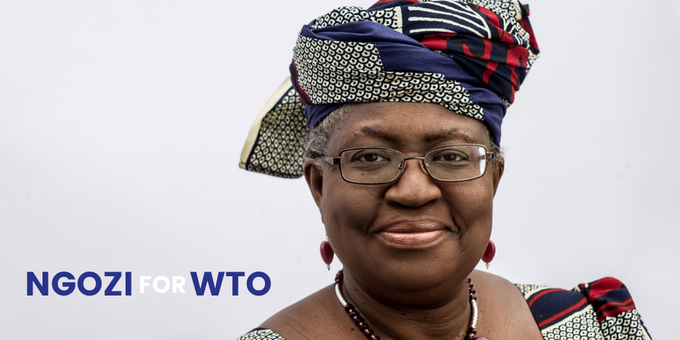Dr. Ngozi Okonjo-Iweala an economist and former finance minister of Nigeria has been appointed as the Director-General of the World Trade Organization (WTO) on Monday at a special meeting of the General Council.
She would be the first woman and the first African national to lead the organization.
According to WTO, she was appointed by the representatives of the 164 member countries. It is required that none of its 164 members will oppose the choice of DG.
Her appointment came after she became the only choice candidate as the South Korean trade minister Yoo Myung-hee withdrew her candidacy on Friday.
Okonjo-Iweala also received the endorsement of the U.S. President Joe Biden which had been blocked by former President Donald Trump who supported the South Korean Candidate.
Okonjo-Iweala in a statement said that her first priority would be quickly addressing the economic and health consequences of the COVID-19 pandemic and to “implement the policy responses we need to get the global economy going again.”
“Our organization faces a great many challenges but working together we can collectively make the WTO stronger, more agile and better adapted to the realities of today,” she said.
Okonjo-Iweala and Yoo Myung-hee were the last standing in October in a selection process that included eight candidates from around the world.
Dr. Okonjo-Iweala served twice as Nigeria’s finance minister, under the administration’s of President Olusegun Obasanjo and President Goodluck Jonathan. She has spent 25 years at the World Bank as a development economist.
She was nominated as Nigeria’s candidate for the office of the Director-General of WTO by President Buhari.
The process for selecting a new Director-General was triggered on 14 May when former Director-General Roberto Azevêdo informed WTO members he would be stepping down from his post one year before the expiry of his mandate. He subsequently left office on 31 August.
About WTO
The WTO was created on 1 January 1995, to replace the General Agreement on Tariffs and Trade (GATT). The Final Act that established the WTO regime was signed on 15 April 1994, during the ministerial meeting at Marrakesh Morocco, and hence is known as the Marrakesh Agreement.
GATT was established by a multilateral treaty of 23 countries in 1947 after World War II in the wake of other new multilateral international economic cooperation such as the World Bank (founded in 1944) and the International Monetary Fund founded around the same time.
From 1948 to 1994, the GATT provided the rules for much of world trade and presided over periods that saw some of the highest growth rates in international commerce. It seemed well-established but throughout those 47 years, it was a provisional agreement and organization.
The WTO’s creation on 1 January 1995 marked the biggest reform of international trade since the end of the Second World War. Whereas the GATT mainly dealt with trade in goods, the WTO and its agreements also cover trade in services and intellectual property. The birth of the WTO also created new procedures for the settlement of disputes.
In 2020, the WTO marked its 25th anniversary, it has 164 member states, with headquarters in Geneva Switzerland.
There have been 9 Director-Generals since 1948 including the serving DG; 4 under GATT and 5 under WTO. The Director-General of the WTO serves a maximum of two 4-year terms.
Ifunanya Ikueze is an Engineer, Safety Professional, Writer, Investor, Entrepreneur and Educator.






















































